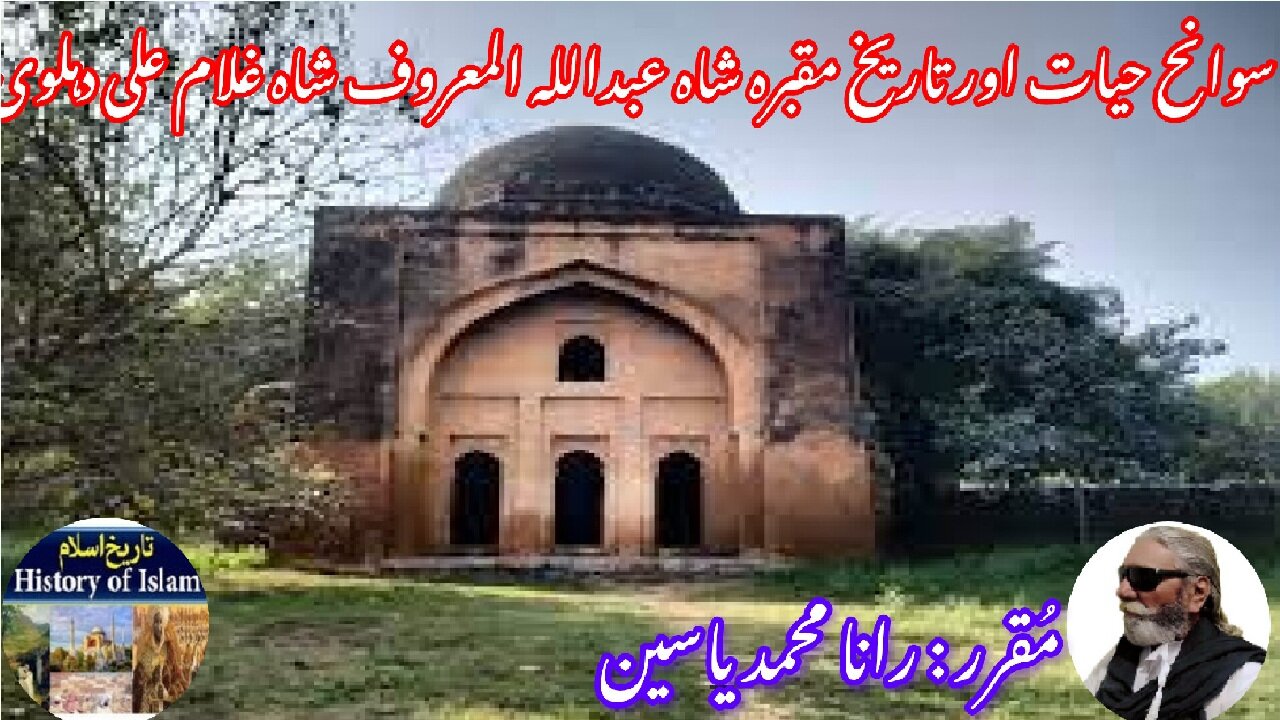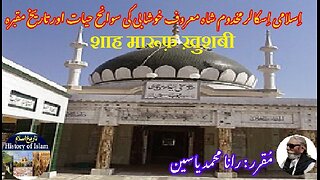Premium Only Content

Shah Ghulam Ali Dehlavi | شاہ عبداللہ المعروف شاہ غلام علی دہلوی کی سوانح عمری اور مزار کی تاریخ
@islamichistory813 #sufisaint #culturalheritage #biography #shahabdullah #shahghulamalidehlavi #islamicmysticism #islamicphilosophy #shrine #historicalfigures
Biography of Shah Abdullah alias Shah Ghulam Ali Dehlavi and the history of his shrine
Dekhti Aankhooon aur sountay kaanoon ko Asslamoalaikum, sisters, brothers friends and elders, in informative series videos of Islamic ascolars, sufisaints, cultural heritages, islamic philosophys, islamic mysticisms and historical figures. today we are describing biography of Shah Abdullah alias Shah Ghulam Ali Dehlavi and the history of his shrine.
Shah Abdullah alias Shah Ghulam Ali Dehlavi was a Sufi Shaykh in Delhi during the early 19th century. He was a master of the Naqshbandi tradition His father wanted to make him a disciple of Qadri,.
He was born in 1156 AH (1743 C.E.) in Patiala, Punjab, in present-day India. His father was Shah Abdul-Latif, a scholar and Sufi shaykh belonging to the Qadri tariqah. It is reported in his biographies that his father had a dream before his birth in which he saw Sayyadna Ali, who told him to name the baby on his name (Ali). After he grew up, he modified his own name to be Ghulam Ali (literally meaning slave of Ali, a common name in Indian Muslims today).
He is reported to have memorized the Quran in a single month's duration. In 1170 AH he came to Delhi to take the oath of allegiance to Mirza Mazhar Jan-e-Janaan, who was a famous Shaykh of Naqshbandi tariqah in Delhi at that time. After getting trained in the major Sufi orders including Naqshbandi for 15 years, he received complete Khilafat (spiritual Ijazah) from his Shaykh.
He had many Khulafa (deputies) who spread the Naqshbandi Sufi order to a vast number of people in the whole Muslim world at that time. His Khulafa went to Bukhara, Baghdad, Madinah and Turkey. His famous khalifa was Mawlana Khalid al-Baghdadi, who had hundreds of thousands of followers in his lifetime, and many Naqshbandi's today in Turkey and nearby countries follow him. His chief deputy and successor was Hafiz Abu-Saeed-Ahmadi Faruqi Mujaddidi Naqshbandi (Delhi) and his next successor was Hafiz Shah Ahmed Saeed Faruqi Mujaddidi, son of Hafiz Shah Abu Saeed (Medina)
He is quoted to have said: "My Faid (spirituality) has reached far off countries. Our Halqa is held in Makkah and our Halqa is held in Madinah. Similarly our Halqa is held in Baghdad, Rome (now Turkey and Cyprus) and Maghrib (Parts of Europe and Africa facing Asia). And Bukhara is our parental home."
Shah Abdullah, also known as Shah Ghulam Ali Dehlavi, was a revered Sufi saint and spiritual leader, known for his deep piety, devotion, and significant influence in the Sufi tradition. Born in Delhi, India, during the late 18th century, he became one of the most respected figures in the Sufi circles of his time. He is especially renowned for his connection with the Chishti Sufi order, which has long been one of the most prominent Sufi traditions in the Indian subcontinent.
Shah Ghulam Ali Dehlavi’s exact birthdate is not well-documented, but it is generally believed that he was born in the 18th century, with some accounts suggesting around 1760. He is believed to have been deeply influenced by the teachings of his spiritual mentors and spent his life propagating the principles of love, devotion, and mystical wisdom. Throughout his life, he emphasized the importance of inner purity, sincerity in worship, and service to humanity.
He died on 22 Safar 1240 AH (15/16 October 1824) and was buried alongside his Shaykh's grave in Khanqah Mirja in Delhi. His death marked the end of a long life dedicated to spiritual guidance, charitable work, and Sufi practices. After his death, his followers, known for their deep affection and reverence, continued to spread his teachings and preserve his legacy. He is remembered not only for his spiritual insight but also for his charitable acts, which helped many during his time.
Shah Ghulam Ali Dehlavi was laid to rest in a shrine in Delhi, which has since become an important spiritual site for his followers. The shrine, located in the Nizamuddin area of Delhi, is a significant center of Sufi worship and attracts devotees from all over the world. The tomb itself is a place of reverence and pilgrimage, where followers come to seek blessings, pay respects, and reflect on his teachings.
The shrine of Shah Ghulam Ali Dehlavi continues to be an important symbol of his spiritual contributions. Visitors often offer prayers, perform rituals, and recite poetry in honor of his memory. The site also serves as a center for Sufi gatherings, where spiritual discourses and practices are held regularly, keeping alive the spirit of his teachings. The legacy of Shah Ghulam Ali Dehlavi remains alive today, both through the ongoing devotion of his followers and through the presence of his shrine, which continues to serve as a beacon of spiritual light and guidance in the heart of Delhi.
With this, we seek your permission until tomorrow, tomorrow we will describe the biography of Khawaja Ghulam Farid (also romanized as Fareed and the history of his maqbara. Allah Hafiz.
================================
-
 4:37
4:37
ISLAMIC HISTORY
1 day agoShah Maroof Khushabi शाह मारूफ़ ख़ुशबी شاہ معروف خوشابی کی سوانح عمری اور مزار کی تاریخ
15 -
 LIVE
LIVE
Welcome to the Rebellion Podcast
12 hours agoTrump has BIG Announcement - WTTR Podcast live 5/7
761 watching -
 LIVE
LIVE
The Bubba Army
22 hours agoSelf-Deporation: The CBP App Offers Free Flights & $1,000 | Bubba the Love Sponge® Show | 5/07/2025
12,953 watching -
 LIVE
LIVE
BEK TV
23 hours agoTrent Loos in the Morning 5/7/2025
448 watching -
 1:08:19
1:08:19
MTNTOUGH Podcast w/ Dustin Diefenderfer
21 hours agoMatt McPherson: How This Bowhunter Built a Multi-Million Dollar Empire Through Grit | MTNPOD #115
34.7K5 -
 25:39
25:39
World Nomac
1 day agoI flew a Stranger to Istanbul for a Hair Transplant
10.1K2 -
 26:39
26:39
JasminLaine
16 hours agoMark Carney STUNNED SILENT as Trump TORCHES Canada on the World Stage
7.81K59 -
 12:28
12:28
The Gun Collective
16 hours agoWOW! 13 NEW Guns JUST Released!
22.3K4 -
 7:00
7:00
The Shannon Joy Show
14 hours agoMedical Freedom’s Dark Secret: HHS & COVID Truth Buried?
8.19K2 -
 31:18
31:18
Uncommon Sense In Current Times
15 hours ago $1.01 earned📺 Title: Iran, Israel and Bible Prophecy! | Mark Biltz
10.1K3